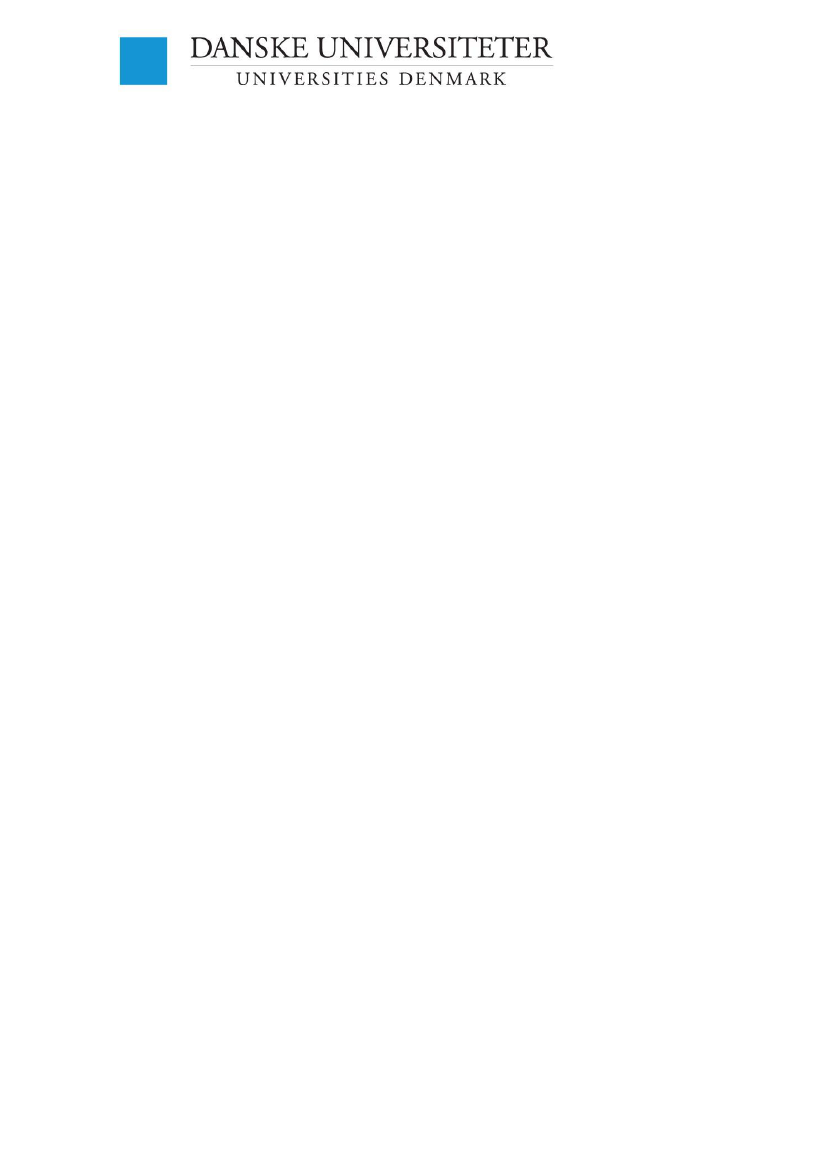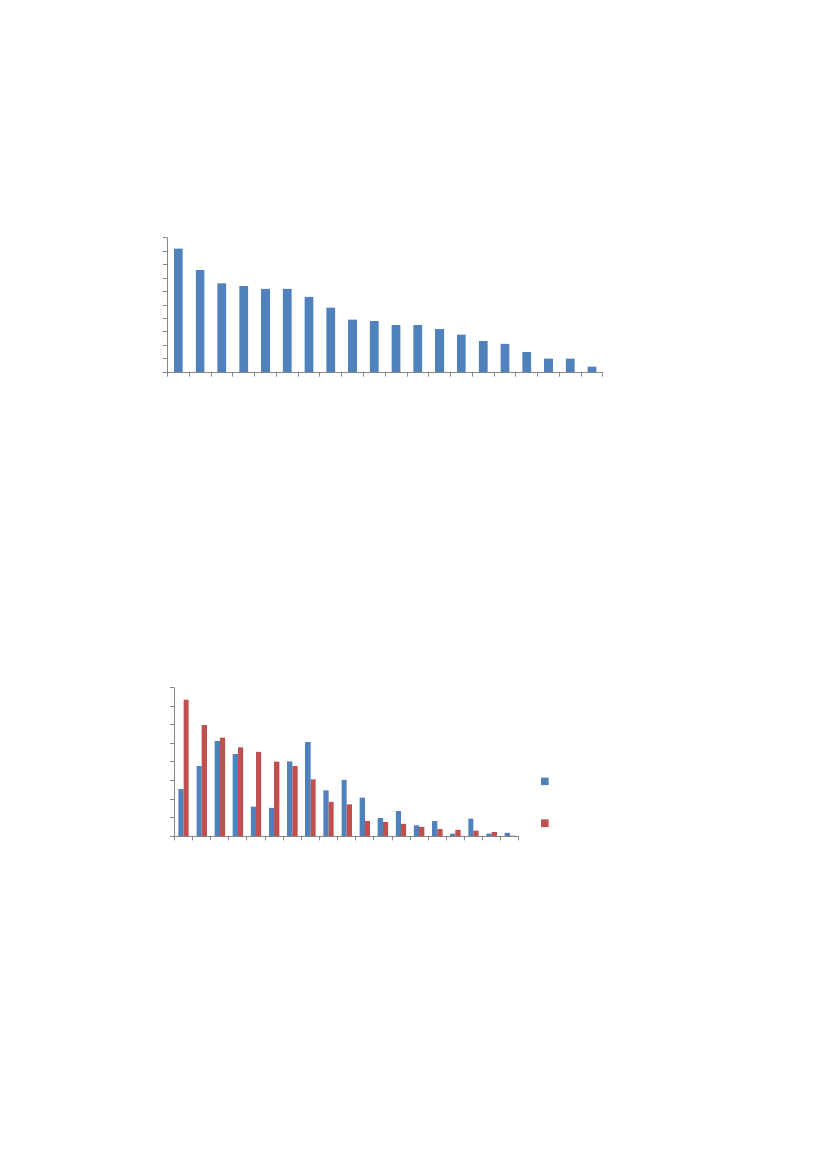Udvalget for Videnskab og Teknologi 2009-10
UVT Alm.del Bilag 285
Offentligt
















Position paper: The Future of European Research, In-novation and Higher EducationPreambleResearch, research-based higher education and research-based innovation mustbe seen as long-term investments. No one knows the exact outcome of researchfrom the start – in that case it would not be research. What we do know is thatblue sky research is the key to developing the knowledge and jobs of tomorrowand in ten years.The coming ten years pose daunting challenges for Europe in the transformationinto an innovation-based knowledge economy. The Europe 2020 strategy setsambitious targets for Europe to become a world leader in this new economy.Education, research and innovation are the main avenues described in this strat-egy towards these goals. As primary providers of higher education, research-based knowledge and innovation universities play an important role in the reali-sation of this strategy. The political choices of Europe during the coming yearswill be crucial in making the most of the potentials of European universities forthe benefit of the European societies.Participating in partnerships across Europe connects Danish universities, re-searchers and students with leading international actors, thus promoting Danishknowledge and skills and bringing cutting-edge knowledge to Denmark. Fur-thermore, the EU-funded programmes within research, innovation and highereducation play an increasingly important role in supporting Danish research en-vironments and the mobility of students.The knowledge triangle of research, higher education and innovation gives uni-versities a crucial role in transforming Europe. This position paper presents thehopes and suggestions of Universities Denmark with respect to the future politi-cal agenda for European research, innovation and higher education.
Universities DenmarkSeptember 2010
Page 2 of 16
Universities DenmarkUniversities Denmark is the association of the eight universities in Denmark andworks to promote the Danish university sector nationally, regionally and interna-tionally.Universities Denmark cooperates with other national university associations andis an active member of the European University Association and Nordisk Uni-versitetsSamarbejde, a forum for Nordic universities.
The Danish university sectorPublic R&D spending in 2010 reached 1 percent of Denmark’s GDP55 percent of all publically funded research in Denmark in 2008 wasconduced at the Danish universitiesUniversities offer bachelor, master and Ph.D.-programmes whereas thevast majority of vocational programmes are offered outside the universitysector27 percent of all Danish tertiary graduates in 2008 graduated from a Dan-ish university
Page 3 of 16
OverviewPreamble ................................................................................................................ 1Overview ............................................................................................................... 330 suggestions for the future of European Research, Innovation and HigherEducation ............................................................................................................... 4Research................................................................................................................. 7European Research Council........................................................................... 7Framework programmes ................................................................................ 8Reduce administrative burdens ...................................................................... 8Joint Programming and Grand Challenges .................................................... 9Researcher mobility ....................................................................................... 9Research-based innovation .................................................................................. 10Public-private partnerships .......................................................................... 10IPR ............................................................................................................... 11Higher Education ................................................................................................. 11EU-funded programmes .............................................................................. 12The future of Erasmus ................................................................................. 12Multidimensional transparency tools .......................................................... 13Quality assurance ......................................................................................... 13Lifelong learning ......................................................................................... 13Employability .............................................................................................. 14Public financing ........................................................................................... 14
Page 4 of 16
30 suggestions for the future of European Research, Innovationand Higher EducationEuropean Research Area1. Universities Denmark supports the suggestion of the European ResearchArea Board to increase investments in research from 3 percent to 5 per-cent of GDP.2. The key driver for European research should remain the promotion of re-search excellence.3. The advise of Universities Denmark is to promote research based highereducation as such university graduates are important disseminators ofknowledge throughout society.European Research Council4. ERC should be given more administrative autonomy and more financialmeans of supporting the very best researchers.5. Universities Denmark suggests that the ERC develops a programme tosupport and build excellence in PhD Schools. Such a programme shouldbe established on the basis of new funding for the ERC.Framework programmes6. Universities Denmark recommends a stronger focus on the quality of re-search in existing and future programmes.7. The basis of administrative procedures should be trust.8. Universities Denmark calls on the Commission to streamline the variousresearch programmes across Directorate Generals.9. Universities Denmark suggests that structural funds should be allocatedto capacity building within research and higher education.Joint Programming and Grand Challenges10. Universities Denmark recognises the need to address Grand Challenges.Universities Denmark advises that diversity and quality become the mainelements in the programmes aimed at addressing these Grand Chal-lenges.11. Universities Denmark is concerned that Joint Programming Initiativesrisk diluting already well-established national research environments.The success of these new politically high profile initiatives therefore re-quires a critical eye on the governance structure and financial models be-hind the Joint Programming Initiatives.12. Universities Denmark hopes that framework programme funds will beused to support Joint Programming Initiatives or other Grand Challengeprogrammes.Researcher mobility13. Universities Denmark supports the continued development of the so-called fifth freedom of mobility of researchers, ideas and students.14. Universities Denmark hopes that Marie Curie will enjoy continued sup-port in years to come.15. Universities Denmark supports the promotion of transparent and com-patible career paths across Europe.
Page 5 of 16
Research-based innovation16. New and revised EU programmes to support innovation should be asopen to international collaboration as possible.17. The strategic headline target on innovation suggested in the Europe 2020strategy should encompass diversity.18. The administrative framework for public-private partnerships should becomparable to the general administrative procedures of other EU-programmes.19. Universities Denmark supports a harmonisation of national rules regulat-ing commercialisation of university IPR as well as the establishment ofan EU Patent and a patent court in the EU.European Higher Education Area (EHEA)20. A diversified higher education sector is essential to maintaining the at-tractiveness and dynamic of the EHEA. The EU institutions and otherEuropean-level actors should recognize diversity as a unique strength ofthe European university sector.21. A particular strength of the Bologna Process has been the high degree ofstakeholder involvement. Europe’s policy-makers should continue to in-volve and consult universities, students and other stakeholders when theydevelop new initiatives and instruments for the purpose of promoting theEHEA.22. A strong link between research and higher education is essential toEurope’s competitiveness in the era of knowledge. Therefore, all univer-sity education should be research-based, and all research should contrib-ute to higher education.23. Even though noticeable progress has been made, many students andscholars are still not benefitting from internationalisation. Therefore, thepromotion of mobility should remain a core theme for the EHEA.The future of Erasmus24. Erasmus should support cooperation between European universities thatfocus on innovative learning methods, including novel use of ICT inhigher education and development of innovative study programmes. Thelink between innovation and higher education has not yet been exploredto the same extent as the relation between research and innovation.Erasmus could strengthen e links between research, innovation andhigher education by supporting European universities in their efforts tomodernize and renew curricula, teaching methods, use of Informationand Communication Technologies etc.25. Erasmus should, to a larger extent, support cooperation and exchange be-tween the university sector and other parts of society. Erasmus grants forstudents going on placement and students on Erasmus Multilateral Pro-jects are steps in the right direction. However, much more could be doneto facilitate collaboration and balance mobility between European uni-versities and the rest of society, e.g. Europe’s industrial and health sec-tors and civil society.
Page 6 of 16
Multidimensional transparency tools26. Universities Denmark supports the development of new and more ad-vanced models of classification, but finds that new systems should takeinto account the diversity of the European university sector.Quality assurance27. Universities Denmark finds it important that a European dimension toquality assurance does not at any time lead to bureaucracy or standardisa-tion of academic content or learning methods.Lifelong learning28. Universities Denmark supports the European Qualification Frameworkfor Lifelong Learning.Employability29. Universities Denmark finds that employability should be assessed in along-term perspective and that trust in the European university sectormust be displayed in order to ensure coherence between learning out-comes and the future demand of the labour market.Public financing30. Universities Denmark sees public financing of higher education as a nec-essary investment in the future. Public financing should therefore be at alevel that enables the universities to maintain a high quality level in theexecution of the multiple tasks that society expects of them.
Page 7 of 16
ResearchResearch, innovation and education combine key means in meeting the chal-lenges described in the Europe 2020 strategy. This knowledge triangle is crucialfor Europe’s long-term wealth and sustainability. The core of this triangle is re-search of the highest quality. The increase in EU’s budget for research, and theaim of investing 3 percent of member state GDP in research and development in2010 are examples of how the EU increasingly see research as an important partof the solution. Looking towards 2020, 3 percent is however not enough.Research is a driving force behind the continuous development of Europeaneconomy. Investments in research provide significant returns, both financiallyand culturally. Therefore, Universities Denmark supports the European ResearchArea Board’s proposal to increase investments in research from 3 percent to 5percent of GDP. Likewise, the EU budget for research should also be markedlyincreased. Concerning EU’s budget for research, the increase should encompassan increased framework programme budget and an increased use of EU’s otherbudget headings to support research and development.The key driver for European research should always be the promotion of re-search excellence. European researchers and research institutions have a primaryresponsibility to promote and support excellent researchers and research envi-ronments, and the main objective of European research policies should underpinthis endeavour. Universities Denmark recognises the aim of promoting growthand social development through strategic research programmes. Building on thequality of research, these strategic programmes are important drivers of the de-velopment of the knowledge base of Europe and of the knowledge based socie-ties of tomorrow.Through excellence, European research can provide the answers to the GrandChallenges we face in Europe and on the global scene; and also pose the ques-tions we have not yet learned to ask. Excellent research is a main criterion forbuilding a competitive European economy.Graduates from universities with research based higher education are importantdisseminators of knowledge throughout society. Excellent and relevant research,also disseminated through graduates, is therefore a vital means of strengtheningthe knowledge base of the European societies and economy.European research programmes, be they strategically targeted or researcherdriven, should be directed primarily at promoting excellence, and excellenceshould decide the selection of individual projects.European Research CouncilUniversities Denmark considers the European Research Council (ERC) to be ofparticular significance, due to its importance to date in promoting research excel-lence and development.ERC has proven to be a significant contributor to research excellence in Europe.Universities Denmark therefore hopes that the coming years will see increased
Page 8 of 16funding and autonomy to ERC. As ERC was launched during the Danish EUpresidency in 2002; it is our aim that the 10-year anniversary of ERC during theDanish presidency in 2012 will see a political will to support the role of ERC inthe European Research Area. Thus ERC should be given more administrativeautonomy and more financial means of supporting the very best researchers.As ERC currently supports upcoming as well as established leading researchers,the aims of ERC could be promoted through the development of an ERC pro-gramme to support and build excellence in PhD Schools. Such a programmeshould be established on the basis of new funding for the ERC. Likewise newERC-funding could be used to support scientific excellence through collabora-tion between the most excellent European researchers.Framework programmesThe framework programme on research is EU’s primary tool for development ofthe European research area. Universities Denmark recommends a stronger focuson the quality of research in existing and future programmes. Also, the criteriafor allocation and evaluation of the funds within the programmes should primar-ily be limited to meeting this central criterion.Instead of regionalisation of framework programme funds, Universities Den-mark suggests that structural funds should be allocated to capacity buildingwithin research and higher education. This could strengthen the overall capaci-ties of the European Research Area without diluting the pre-eminence of re-search excellence.Reduce administrative burdensUniversities Denmark recognises the recent attempts to simplify administrativeprocedures in terms of applications and administration of programme funds. Fur-ther, Universities Denmark recognises the Commission’s wish to continuouslysimplify these.Universities Denmark hopes that the midterm evaluation of FP7 and the futureframework programmes will result in substantial simplification of bureaucraticrules and procedures for applying and administrating EU research funding.Therefore Universities Denmark suggests that across all EU programmes proce-dures will become transparent and comparable, aiming at drastically reducingadministrative burdens. Resources for research should fund new knowledge andnew co-operation; not application forms. The basis of administrative proceduresshould be trust.Universities Denmark encourages the continuous dialogue between relevant ac-tors within research when designing administrative procedures. In the develop-ment of these new tools it is vital that excellence remains the primary criterionof relevance.Research is being supported from many parts of the European Commission. Thisstrong support is welcomed, but the numerous programmes across DirectorateGenerals have resulted in a fragmentation of administration and interpretation ofrules. Universities Denmark calls on the Commission to streamline the variousresearch programmes.
Page 9 of 16
Joint Programming and Grand ChallengesThe strength of the European Research Area is the combination of diversity andquality. Through a rich and varied research profile European researchers andresearch institutions draw strength and inspiration from each other to developoutstanding research across all fields. To merge the rich variation of researchprofiles and research programmes towards common solutions can be a strongoutcome. On the other hand, synergy and common goals must not undermine thediversity, which is a unique strength of European research.Europe’s researchers and universities are a central part of the answer to the chal-lenges that European countries face collectively. Through identification ofcommon challenges, i.e. the ‘Grand Challenges’, research resources acrossEurope can be gathered to meet these challenges. This especially applies whenresearchers, universities and other actors have the freedom to find solutions andto cooperate across disciplines. Hence, openness, freedom and quality are theprimary criteria for these Grand Challenges to be met.It is important that programmes do not overlap across national, regional andEuropean levels. Therefore, it is decisive that for instance Joint ProgrammingInitiatives maintain a focus on quality rather than induce duplications and RedTape or dilute existing research areas.Universities Denmark welcomes increased coordination of research fundingacross Europe to bring together European resources to solve Grand Challenges.Universities Denmark is nevertheless concerned that Joint Programming Initia-tives run the risk of diluting national research environments that are already wellestablished. The success of these new politically high profile initiatives thereforerequires a critical eye on the governance structure and financial models behindthe Joint Programming Initiatives.In order to attain real critical mass and to create incentives to join initiativessuch as Joint Programming Initiatives, Universities Denmark hopes that frame-work programme funds will also be used to support these initiatives. WithoutCommission funding, it is our fear that the Joint Programming Initiatives willnot become the success envisioned.Researcher mobilityUniversities Denmark supports the development of the so-called fifth freedom,whereby researchers, ideas and students move freely across national borders.Due to the borderless nature of knowledge, the fifth freedom should not only beseen in a narrow European context. Universities Denmark therefore encouragesnational and European barriers to the mobility of students and researchers to bebroken down and Europe and individual member states to become more opentowards the world outside of Europe.For the Danish universities, the Marie Curie programme has been of great im-portance, and it is the hope of Universities Denmark that the continued devel-opment of this programme will enjoy continued support in years to come.
Page 10 of 16European universities and research institutions should support the mobility ofresearchers by promoting transparent and compatible career paths.
Research-based innovationA strong European research area is a precondition for Europe to remain in a cen-tral position in the world economy and culture. It is also a precondition forEuropean researchers, research institutions and the business world to interactwith partners on a global level.For centuries the cooperation between European researchers, research institu-tions and the business world has been of decisive importance for the develop-ment of European societies. Globalisation enhances the possibilities and needsfor cooperation. Europe’s continuous development towards becoming a strongknowledge economy demands well-functioning cooperation between universitiesand the business world. This dynamic presupposes strong, free universities, awell-educated international labour force and a strong innovation-ready businesscommunity.The increasing competition between the industrialised and emerging regions ofthe world, coupled with the economic downturn in the European economy, maypromote a closed Eurocentric approach to innovation. Universities Denmarkstrongly advises against such developments. To truly compete and grow in thenew global economy, European innovators and companies need to be membersof global networks. New and revised EU programmes to support innovationshould therefore be as open to international collaboration as possible.Based on autonomy and sufficient funding, universities could become vital ac-tors in European innovation as innovation hubs.Strong and independent universities support innovative societies, just like uni-versities contribute to innovation through their cooperation with business part-ners. Europe can become the world’s most innovative economy if society, re-search institutions and the business world can focus their resources on creatingnew knowledge and use this actively. The strategic headline target on innovationsuggested in the Europe 2020 strategy should therefore encompass diversity as ameans to promote innovation. One unifying goal may imply the risk of overlook-ing the important aspects of innovation and thereby moving the focus away fromcentral development possibilities.Public-private partnershipsThe focus of the EU on public-private partnerships within research, e.g. JointTechnology Initiatives, can strengthen the cooperation between universities andresearch. Bringing public and private funding into mutual research collaborationwill be an important aspect of lifting European research and bringing ideas tomarket, provided it is borne in mind that universities are not development de-partments. The optimal use of the gathered resources for these partnerships pre-supposes transparency and foreseeable administrative procedures. Therefore, theadministrative framework for such partnerships should be comparable to thegeneral administrative procedures of other EU-programmes.
Page 11 of 16IPRKnowledge cooperation between universities and the business world shouldbuild on clear agreements on Intellectual Property Rights (IPR). UniversitiesDenmark therefore supports a harmonisation of national rules regulating com-mercialisation of university IPR based on the Commissions recommendation onthe management of intellectual property in knowledge transfer activities andcode of practice for universities and other public research institutes, as well asthe establishment of an EU Patent and a patent court in the EU. Clear IPR-agreements founded in a free space for negotiations ensure that ideas can emergeand be developed for the benefit of both research and growth. To ensure longterm use of knowledge, the way in which partners in research cooperationchoose to distribute the rights to the knowledge should be based on individualnegotiations. This principle should be part of all research programmes, whichshould therefore have the same basic principles for dealing with IPR, publica-tion, access, etc.
Higher EducationAlthough education is more central to the Lisbon treaty than to previous treaties,the EU continues to have no formal power as regards higher education. Still, theEU is a key player with respect to the development of the European Higher Edu-cation Area (EHEA). The EU influences the development of EHEA by fundingprogrammes, by sponsoring development projects and by setting targets for themodernization of European higher education. Furthermore, the European Com-mission and the European Council prepare statements and policy papers on thefuture of European higher education.Taking the current recession and its consequences for the European labour mar-ket into consideration, higher education is as important as ever before. There-fore, Universities Denmark strongly supports the development of the EHEA andregards a coherent and transparent European sector of higher education as a pre-requisite for maintaining a competitive European economy and a thriving Euro-pean culture. Nevertheless, Universities Denmark recommends the following:A strong link between research and higher education is essential toEurope’s competitiveness in the era of knowledge. Therefore, all univer-sity education should beresearch-based,and all research should contrib-ute to higher education.A diversified higher education sector is essential to maintaining the at-tractiveness and dynamic of the EHEA. The EU institutions and otherEuropean-level actors should recognizediversityas a unique strength ofthe European university sector.Even though noticeable progress has been made, many students andscholars are still not benefitting from internationalisation. Therefore, thepromotion of mobilityshould remain a core theme for the EHEA.A particular strength of the Bologna Process has been the high degree ofstakeholder involvement. Europe’s policy-makers should continue toin-volve and consultuniversities, students and other stakeholders when theydevelop new initiatives and instruments that are to promote the EHEA.
Page 12 of 16The Bologna Process should address the issue of the recognition of jointdegrees more proactively. Unfortunately, recognition problems are com-mon within the EHEA, even though Erasmus Mundus and other EU-funded programmes promote joint degrees.EU-funded programmesWithout a doubt, EU-funded programmes such as the Lifelong Learning Pro-gramme and the Erasmus Mundus Programme have had a positive effect on themobility of students and teachers – not only within the EU, but also betweenEurope and other parts of the world.Considering the success of the programmes until now and given that Europe iscurrently facing an economic crisis as well as growing unemployment numbers,Universities Denmark proposes to invest more ambitiously in the EU’s highereducation programmes.Furthermore, EU’s higher education programmes should be open to all qualifieduniversities within the EU, regardless of the national legislation that these uni-versities are subject to. If the programmes are to facilitate the exchange ofknowledge, promote academic excellence and foster intercultural understandingacross all of Europe, broad participation is essential.Lastly, uncomplicated and unbureaucratic procedures for application, participa-tion and reporting are indispensable if programme participation is to remain at-tractive to European universities.The future of ErasmusErasmus is a sub-programme within the overarching Lifelong Learning Pro-gramme and is the EU’s flagship programme for mobility within higher educa-tion. Erasmus has existed since 1987, and Danish universities have participatedsince its beginning.Universities Denmark recognizes the significant impact that Erasmus has had onthe mobility of European students and scholars. Promotion of mobility shouldremain a principal aim for the programme. However, Universities Denmarkfinds that the time has come to introduce new purposes for Erasmus. This wouldhelp ensure that the programme continues to support the modernisation of Euro-pean higher education in the years to come. Therefore, Universities Denmarkproposes to add the following two new dimensions to Erasmus:Erasmus should support cooperation between European universities thatfocus oninnovative learning methods, including novel use of ICT inhigher education, and on the development of innovative study pro-grammes.The link between innovation and higher education has not yetbeen explored to the same extent as the relation between research and in-novation. Erasmus could strengthen the links between research, innova-tion and higher educatione by supporting European universities in theirefforts to modernise and renew curricula, teaching methods, the use ofICT etc.Erasmus should, to a larger extent, supportcooperation and exchangebetween the university sector and other parts of society.Erasmus grants
Page 13 of 16for students going on placement and Erasmus Multilateral Projects aresteps in the right direction. However, much more could be done to facili-tate collaboration and balance mobility between European universitiesand the rest of society, e.g. Europe’s industry, health sector and civil so-ciety.Multidimensional transparency toolsThe European Commission has commenced several projects concerning classifi-cation and ranking, as several problems were identified in the existing models ofranking. An example is the high degree of focus on popularity, as well as thecomparison between entire institutions rather than single study programmes.The two models, U-map and U-multirank, have been developed with supportfrom the Commission. Each tries to compare universities in a new and more nu-anced way. These differ from the current models of ranking by not only lookingat an aggregated level but also allowing the user to compare individual studyprogrammes of her own choice. U-map makes it possible to compare institutionson six different dimensions but does not aim at a ranking of individual institu-tions. U-multirank makes it possible to compare individual study programmes onsix different dimensions.Universities Denmark supports the development of new and more advancedmodels of classification, but finds that new systems should take into account thediversity of the European university sector. New European models of classifica-tion should reflect the full spectrum of strengths of European universities. Fur-ther, classification models should fulfil the criteria proposed in theBerlin prin-ciples,particularly that such systems should have clear purposes and well-defined target groups. Classification may lead to more transparency in the Euro-pean university sector, but Universities Denmark remains critical as to whetherclassification and ranking may lead to more quality in higher education.Quality assuranceUniversities Denmark supports the European standards and guidelines for qual-ity assurance. If European universities are to cooperate across borders it is vitalto have a common understanding of quality assurance. This should not only con-cern the cooperating universities but also the national agencies for quality assur-ance.Universities Denmark finds it important that a European dimension on qualityassurance does not at any time lead to bureaucracy or standardisation of aca-demic content or learning methods. The autonomy of the individual higher edu-cation institution and the diversity of the European university sector should berespected.Lifelong learningUniversities Denmark supports the European Qualification Framework for Life-long Learning and has contributed actively to the formulation and certification ofthe Danish qualification framework. There is no doubt that the promotion oflifelong learning is important, especially at times with high unemployment lev-els.
Page 14 of 16EmployabilityThe Europe 2020 strategy suggests that learning outcomes should be geared tomatch labour market needs better. Universities Denmark agrees that higher edu-cation should qualify students for the labour market and will continue the con-structive dialogue on the future educational needs with other parts of society.Learning outcomes should not solely be based on the current needs of the labourmarket but should also consider the needs for highly skilled labour in 5 to 10years’ time. It is the experience of Universities Denmark that it is difficult forboth employers and politicians to predict which competencies are needed in thefuture.Universities Denmark finds that employability should be assessed in a long-termperspective and that the European university sector must be trusted to ensurecoherence between learning outcomes and the future demand of the labour mar-ket.Public financingOn several occasions, the Commission has emphasised that diversification ofincome source is important to ensure a stable economic foundation for a highereducation institution.Universities Denmark sees public financing of higher education as a necessaryinvestment in the future. Public financing should therefore be at a level that en-ables the universities to maintain a high quality level in the execution of the mul-tiple tasks that society expects of them. New sources of income must not becomean excuse for a reduction in public funds for higher education.
Page 15 of 16Participation in the 7thFramework ProgrammeDenmark is the third-most active EU member state when it comes to participa-tion in the 7th Framework Programme (measured in funding per capita).
EU-funding pr. capita (euro)
1009080706050403020100PortugalAustria
Ireland
Finland
The Netherlands
Germany
Switzerland
United Kingdom
Hungary
Norway
Belgium
Greece
Incoming Erasmus studentsDenmark receives the 5thmost Erasmus students when compared to other Euro-pean countries with a population below 10 million.International student mobility in countries with less than
10 million inhabitants
800070006000500040003000200010000SwedenFinlandBelgiumPortugalDenmarkIrelandAustriaCzech RepublicGreeceHungaryLithuaniaSloveniaSlovakiaEstoniaLatviaMaltaBulgariaCyprusLuxembourg
OutgoingstudentsIncomingstudents
Czech Republic
Denmark
Sweden
Poland
Israel
France
Italy
Spain
Page 16 of 16Contact informationUniversities DenmarkFiolstræde 44, 1. th.DK-1171 Copenhagen KDenmarkPhone: (+45) 33 92 54 05Telefax: (+45) 33 92 50 75E-mail: [email protected]www.dkuni.dkThe Danish universities:University of Copenhagenwww.ku.dkAarhus Universitywww.au.dkUniversity of Southern Denmarkwww.sdu.dkRoskilde Universitywww.ruc.dkAalborg Universitywww.aau.dkTechnical University of Denmarkwww.dtu.dkCopenhagen Business Schoolwww.cbs.dkIT University of Copenhagenwww.itu.dk
















